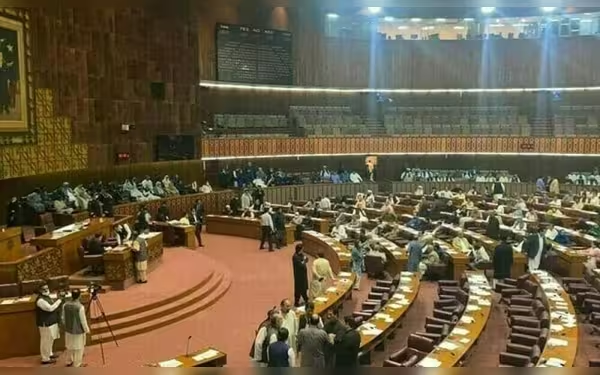Saturday, November 16, 2024 10:54 PM
NA Approves Bills to Extend Tenure of Services Chiefs and Increase SC Judges
- NA passes bills to extend military chiefs' tenures.
- Supreme Court judges' strength increased to 34.
- Opposition labels legislation as an attack on democracy.
 Image Credits: brecorder
Image Credits: brecorderNA passes bills to extend military chiefs' tenures and increase Supreme Court judges, sparking debate on democracy and governance.
The recent legislative developments in Pakistan have sparked significant discussions across the political landscape. On Monday, the National Assembly (NA) and the Senate passed crucial bills aimed at extending the tenures of the armed services chiefs and increasing the number of judges in the Supreme Court. This move has raised eyebrows and ignited debates about its implications for democracy and governance in the country.
Defence Minister Khawaja Asif introduced a bill in the NA that seeks to extend the tenure of the Chief of the Army Staff, Chief of the Naval Staff, and Chief of the Air Staff from three years to five years. This change is seen as a way to ensure stability and continuity within the armed forces, which play a pivotal role in Pakistan's security framework. The rationale behind this extension is to align the military leadership's term with the five-year term of elected governments, thereby fostering a sense of consistency in policy-making.
In a parallel development, Law Minister Azam Nazeer Tarar presented a separate bill proposing to increase the number of Supreme Court judges from the current count to 34. Tarar emphasized that this amendment is essential for addressing the backlog of cases in the judiciary. He stated, "This amendment will increase the number of judges in the Supreme Court up to 34, so that the backlog of cases can be cleared, and that after the 26th amendment, we can have judges to form the constitutional benches." This move is aimed at enhancing the efficiency of the judicial system, which has been under pressure due to a growing number of pending cases.
Despite the government's efforts, the passage of these bills was not without controversy. The opposition, particularly the Pakistan Tehreek-e-Insaf (PTI) party, vehemently opposed the legislation, labeling it as "an attack on democracy". Opposition Leader Omar Ayub expressed concerns, stating, "It is neither good for the country nor for the armed forces." The PTI lawmakers actively protested during the sessions, with some even tearing apart copies of the bills in a show of dissent.
In defense of the bills, Information Minister Attaullah Tarar argued that extending the tenure of service chiefs is a pragmatic approach. He remarked, "There is no harm if the tenure of any services chief is extended to five years like we have a five-year term for a government. It will help bring stability and continuity of policies within institutions." This perspective highlights the government's intention to create a more stable environment for both military and civilian governance.
Under the new legislation, General Munir, who assumed office in November 2022, will now serve until 2027, despite the standard retirement age of 64 for a general. This extension raises questions about the balance of power and the potential for political influence within the military hierarchy.
The recent passage of these bills marks a significant moment in Pakistan's political and judicial landscape. While the government argues that these changes will promote stability and efficiency, the opposition's concerns about democratic integrity cannot be overlooked. As Pakistan navigates these complex issues, it is crucial for all stakeholders to engage in constructive dialogue to ensure that the nation's democratic principles are upheld while addressing the practical needs of governance.













